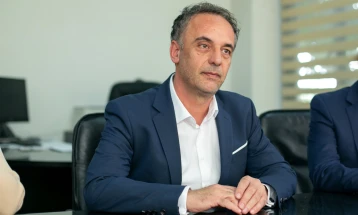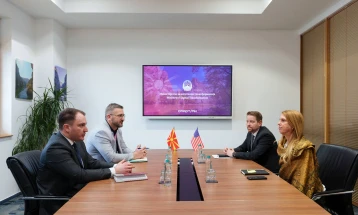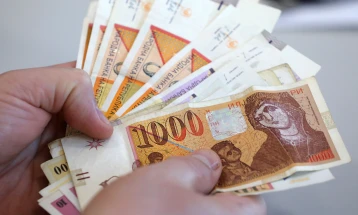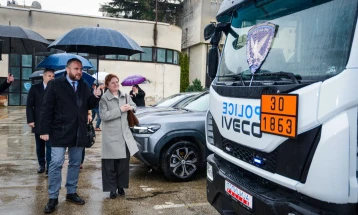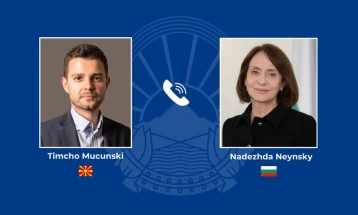Constitutional Court, Faculty of Law sign memorandum of cooperation
- Constitutional Court President Darko Kostadinovski and the Dean of the Iustinianus Primus Law Faculty in Skopje signed Thursday a Memorandum of Cooperation on establishing cooperation, exchange of knowledge and experience, strengthening institutional capacities, and raising the political and legal culture in the country.
- Post By Nevenka Nikolik
- 14:59, 11 July, 2024
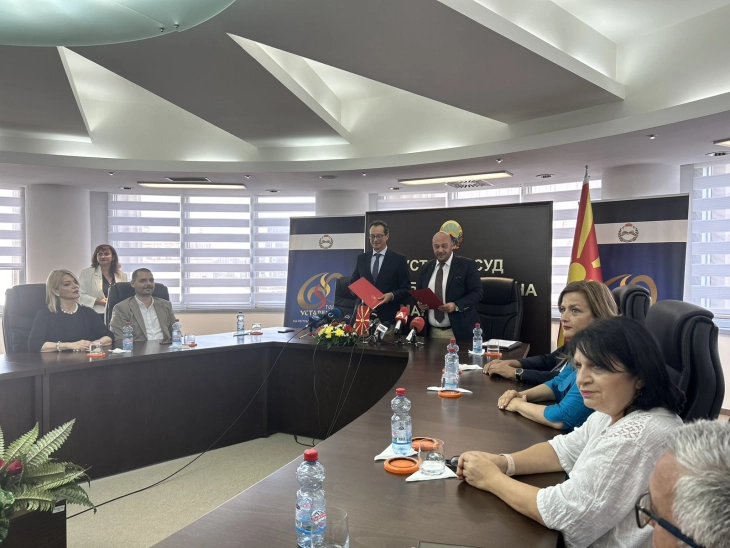
Skopje, 11 July 2024 (MIA) - Constitutional Court President Darko Kostadinovski and the Dean of the Iustinianus Primus Law Faculty in Skopje signed Thursday a Memorandum of Cooperation on establishing cooperation, exchange of knowledge and experience, strengthening institutional capacities, and raising the political and legal culture in the country.
Kostadinovski said that to him as a Judge and President of the Constitutional Court, signing this memorandum is good news, because, according to him, the inclusion and contribution of science in the Constitutional Court will be of great significance, and the memorandum itself will yield benefits for both institutions.
"It is no coincidence that I have made it a top priority to increase the presence of science in the Constitutional Court. First, my personal assessment is that the Constitutional Court has lacked science far too long, which is something we must fix. Professor Georgievski said that the relationship between the Faculty of Law and the Constitutional Court is natural and normal, and that mutual interaction will yield benefits for both institutions, especially issues important for constitutional judiciary, of which there are many. Second, I believe that the state of affairs in the country and public trust, not only in the judicial system but in the state system in general, is the diminishing political, legal, constitutional, and judicial culture. This is one of the forms we can collaborate on and raise that culture, because its long absence is the reason why we are in this situation. There are many forms of cooperation, I expect it to be fruitful and am glad that my double mentor and I signed this memorandum," Kostadinovski stressed, adding that he will do everything in his power to implement all contents.

Professor Georgievski said that the Constitutional Court is not a regular court, but an institution that stands above the legal system, above the constitutional and legal order with a very serious task of filling up gaps, establishing directions and principles for law, the functioning of the legal system, which is why the Constitutional Court simply needs an academic base.
"It is no coincidence that Constitutional Courts around the world have in their ranks representatives that are scholars and renowned lawyers, who have published numerous works and have experience in that field. This is where we converge, we are very interested in intense cooperation and help raise the legal culture within the frameworks of professionals, and elevating the authority of both institutions. We already established an agenda for cooperation, which speaks of our willingness and readiness for cooperation," Georgievski noted.
In response to a reporter's question on what the agenda entails, Kostadinovski explained that these next few days they will determine the topics and dilemmas of all legal areas, and there will be two workshops, one in October at the Constitutional Court, and the other towards the end of the year at the Faculty of Law. This cooperation, among other things, foresees setting up a student volunteering program at the Court, for undergraduate, graduate, and doctoral students to carry out research, joint application for project in the field of constitutional law and judiciary, and engagement of faculty representatives when preparing specific reports and dictionaries.
“For me, the most important thing is to listen to experts on important constitutional-legal issues and dilemmas that arise every day in the course of each subject, in each session. The idea is to help each other – in a legal sense to help us as judges raise the credibility and reputation of the Constitutional Court, but on the other hand we also help the Faculty of Law, as one of the oldest institutions in the country, to help its credibility and reputation,” said Kostadinovski.
The Memorandum of Cooperation will enter into force on the date of its conclusion. ssh/nn/
Photo/video: MIA


